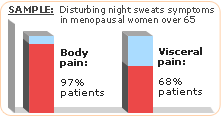A surprising new study led by James Mold et al. reports that night sweats (and hot flashes as well) are a surprisingly common issue for men and women alike after the age of 65, regardless of menopause.
In order to examine night sweats in aged patients, the doctors questioned 2,767 patients, 41% of whom had had night sweats within the month. Of those patients, 23% suffered from night sweats alone, while 18% complained of diurnal as well as nocturnal sweating.
Although both men and women experienced their most uncomfortable and most frequent symptoms from the ages of 41 to 55, this investigation focused on elderly individuals in order to isolate the effects of night sweats themselves from the effects of menopause and its associated symptoms. Night sweats during menopause are most often caused by estrogen deficiency, but because both aged men and postmenopausal women endure night flashes, in this older group that is less likely to be the case. In this study, 30% of patients over the age of 65 reported night sweats.

The investigators asked the subjects about the frequency and degree of force of their night sweats, as well as to what degree the patients found them disturbing. 10.3% of questioned patients observed that they were noticeably troubled by night sweats: 70% described night sweats as causing them some trouble, “20% a fair amount of trouble, and 10% a great deal of trouble.”
Night sweats in elderly individuals were also associated with bodily and visceral pains: 97% of patients reporting night sweats also noted body pain (in the muscles, joints or bones), while 68% suffered from visceral pain (in the stomach or chest, genitals, oral pain, headache or eye pain). Fever, muscle cramps and tingling were also associated with night sweats, likely due to dehydration and mineral and potassium loss. Anxiety and nervousness were also associated with patients experiencing night sweats.
In conclusion, given the prevalence of night sweats amongst men and women in their sixties and older, the study recommends that health care providers for senior citizens pay special attention to this potentially disturbing symptom.